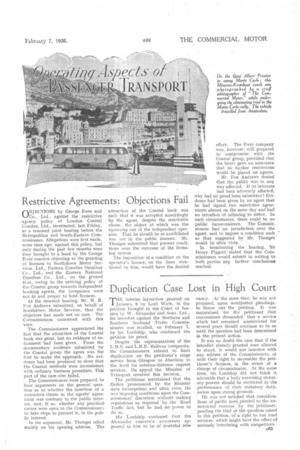Duplication Case Lost in High Court
Page 117

If you've noticed an error in this article please click here to report it so we can fix it.
THE interim injunction granted on January 8 by Lord Wark, in the petition brought in the Court of Session by W. Alexander and Sons, Ltd., for interdict against the Northern and Southern Scotland Traffic Commissioners was. recalled, on February '1, by his Lordship, who continued the petition for proof.
Despite the representations of the L.M.S. and L.N.E. Railway companies, the Commissioners refused to limit duplication on the petitioner's stage service from Glasgow to Aberdeen to the level for extreme-distance express services. On appeal the . Minister of Transport reversed this decision.
The petitioner maintained that the Orders pronounced by the Minister were incompetent and ultra vires. He was imposing conditions upon the Commissioners' discretion without making regulations as required by _the Road Traffic Act, but he had no power to do so.
His Lordship confessed that the Alexander concern's averments ap: peared to him to be of doubtful rel.
vancy. At the same time, he was not prepared, upon unadjusted pleadings, to throw out the petition. It was maintained for the petitioner that convenience demanded that a service which had remained unrestricted for several years should continue to be so until the question had been determined in the present action.
It was no doubt the case that if the interdict already granted were allowed to stand, it would not interfere with any scheme of the Commissioners, or with their right to rec.pnsider the petitioner's licences, in the event of a change of circumstances. At the same time, his Lordship did. not think it advisable that a body exercising statutory powers should be restricted in the performance of their statutory duty, unless upon strong grounds.
He was not satisfied that considerations of public need pointed to the unrestricted exercise by the petitioner, pending the trial of the question raised in this petition, of a right to run road services, which might have the effect of seriously interfering with competitors.




































































































































































